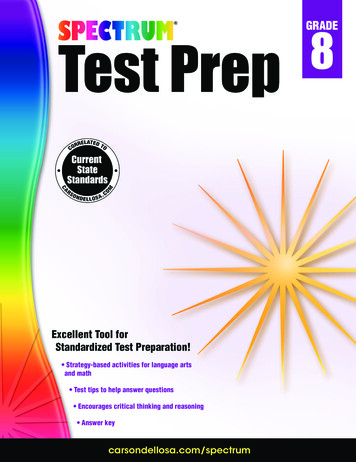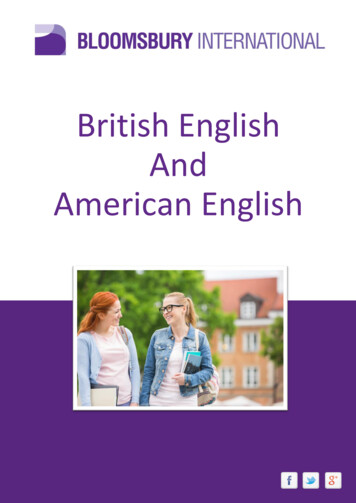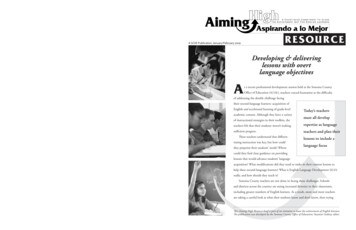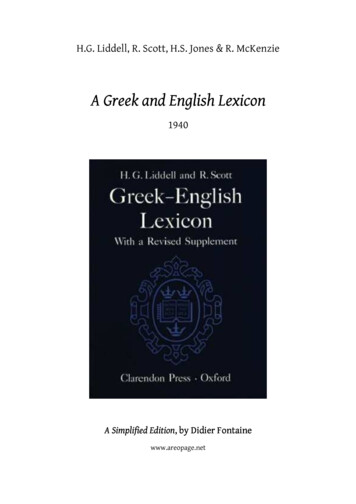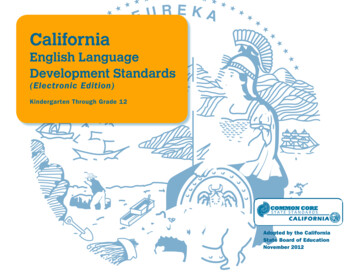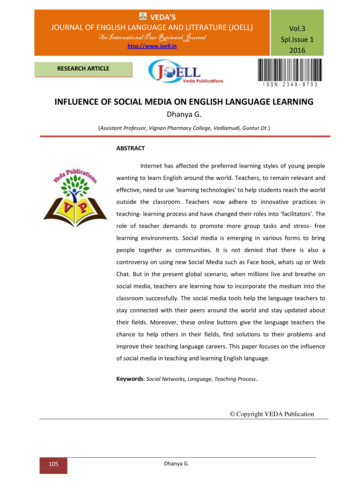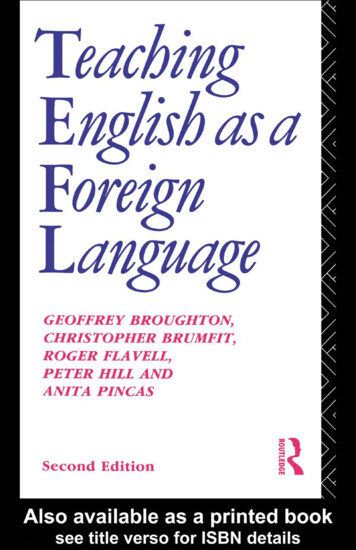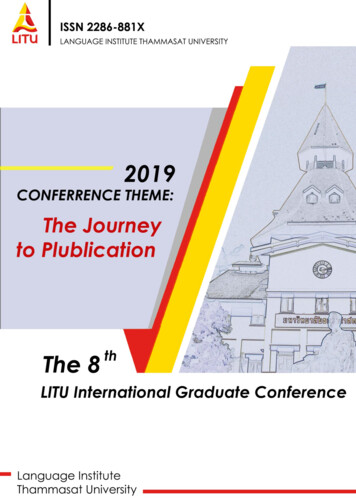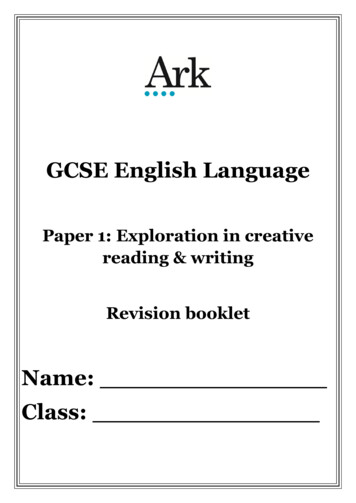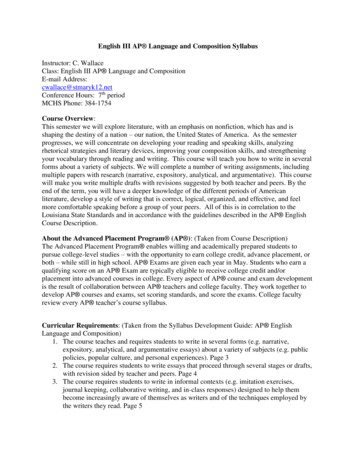
Transcription
English III AP Language and Composition SyllabusInstructor: C. WallaceClass: English III AP Language and CompositionE-mail Address:cwallace@stmaryk12.netConference Hours: 7th periodMCHS Phone: 384-1754Course Overview:This semester we will explore literature, with an emphasis on nonfiction, which has and isshaping the destiny of a nation – our nation, the United States of America. As the semesterprogresses, we will concentrate on developing your reading and speaking skills, analyzingrhetorical strategies and literary devices, improving your composition skills, and strengtheningyour vocabulary through reading and writing. This course will teach you how to write in severalforms about a variety of subjects. We will complete a number of writing assignments, includingmultiple papers with research (narrative, expository, analytical, and argumentative). This coursewill make you write multiple drafts with revisions suggested by both teacher and peers. By theend of the term, you will have a deeper knowledge of the different periods of Americanliterature, develop a style of writing that is correct, logical, organized, and effective, and feelmore comfortable speaking before a group of your peers. All of this is in correlation to theLouisiana State Standards and in accordance with the guidelines described in the AP EnglishCourse Description.About the Advanced Placement Program (AP ): (Taken from Course Description)The Advanced Placement Program enables willing and academically prepared students topursue college-level studies – with the opportunity to earn college credit, advance placement, orboth – while still in high school. AP Exams are given each year in May. Students who earn aqualifying score on an AP Exam are typically eligible to receive college credit and/orplacement into advanced courses in college. Every aspect of AP course and exam developmentis the result of collaboration between AP teachers and college faculty. They work together todevelop AP courses and exams, set scoring standards, and score the exams. College facultyreview every AP teacher’s course syllabus.Curricular Requirements: (Taken from the Syllabus Development Guide: AP EnglishLanguage and Composition)1. The course teaches and requires students to write in several forms (e.g. narrative,expository, analytical, and argumentative essays) about a variety of subjects (e.g. publicpolicies, popular culture, and personal experiences). Page 32. The course requires students to write essays that proceed through several stages or drafts,with revision sided by teacher and peers. Page 43. The course requires students to write in informal contexts (e.g. imitation exercises,journal keeping, collaborative writing, and in-class responses) designed to help thembecome increasingly aware of themselves as writers and of the techniques employed bythe writers they read. Page 5
4. The course requires expository, analytical, and argumentative writing assignments thatare based on readings representing a wide variety of prose styles and genres. Page 6-85. The course requires nonfiction readings (e.g. essays, journalism, political writing, sciencewriting, nature writing, autobiographies/biographies, diaries, history, and criticism) thatare selected to give students opportunities to identify and explain an author’s use ofrhetorical strategies and techniques. If fiction and poetry are also assigned, their mainpurpose should be to help students understand how various effects are achieved bywriters’ linguistic and rhetorical choices. Page 96. The course teaches students to analyze how graphics and visual images both relate towritten texts and serve as alternative forms of text themselves. Page 107. The course teaches research skills, and in particular, the ability to evaluate, use, and citeprimary and secondary sources. The course assigns projects such as the researchargument paper, which goes beyond the parameters of a tradition research paper byasking student to present an argument of their own the includes the analysis and synthesisof ideas from an array of sources. Page 11-128. This course teaches students how to cite sources using a recognized editorial style (bothModern Language Association and the American Psychological Association). Page 139. The AP teacher provides instruction and feedback on students’ writing assignments, bothbefore and after the students revise their work, that help the students develop these skills: A wide-ranging vocabulary used appropriately and effectively A variety of sentence structures, including appropriate use of subordination andcoordination Logical organization, enhanced by specific techniques to increase coherence, such asrepetition, transitions, and emphasis A balance of generalization and specific, illustrative detail An effective use of rhetoric, including controlling tone, establishing and maintainingvoice, and achieving appropriate emphasis through diction and sentence structure.Page 14-22Supplies Needed1. Blue or Black ink2. #2 Pencils3. Highlighter (for annotating)4. Colored pencils (for annotating)5. College-ruled Loose Leaf Paper6. Binder7. Dividers (optional – possible ideas below) MUGS and Vocabulary Learning logs Annotations on literature/nonfiction Writing The AP test/EOC8. Sticky notes (for annotating)Wallace 2
Specific Classroom Rules1. Be on time, on task, and prepared to learn.2. Be responsible for your own learning.3. Trash goes in the trashcan. #notyourmaid4. No whining (only warm, fuzzy feelings allowed)5. Never give up (or say you do not know).Negative Consequences: If you choose to break a rule.First time:Verbal warningSecond time: Behavioral slip – 1st minor infraction formThird time: Parents called – 2nd minor infraction formFourth time: Major referral to the officeNote: The more severe the offense, the quicker the consequences escalate.Positive Consequences: If you choose to follow the rules.Praise (daily)Positive notes home (randomly)Music time while writing (randomly)Specific Daily Procedures1. Bell rings - Get all books and materials out for class.2. MUGS, Vocabulary, EOC and/or ACT practice3. Introduction4. Objectives5. Lesson6. Activity7. Review/ClosingGrading ProceduresAny quiz or test is for independent/individual work. If you decide to make it group work or youcheat, I will make your score an automatic zero. Writings will be reviewed by peers and teacherbefore submission, but all words should be original and/or cited accordingly. Lying, plagiarizing,cheating, or committing testing irregularities such as talking, gesturing, or walking around willresult in an automatic zero. If it is blatant plagiarizing (i.e. you took/bought someone’s wholeessay or a portion of a previously published essay), you may be brought before a panel ofteachers/administrators to seek disciplinary action. If at any time you fail to followdirections, you may receive a zero for the grade. When an assignment is due on a specified day,turning it in after 15 minutes of class have elapsed is considered late. A late grade will receive aletter lower (same day late) or receive half credit (next day late). MUGS/Vocabulary are Monday - Thursday. You will be quizzed on Fridays. Quizzesare 20 points each/weekly.Wallace 3
EOC/ACT work - As juniors, you will be assessed on English III coursework in May(spring) through End of Course testing (EOC). This counts as 15% of your final grade.You must pass either the English II or III (EOC) to graduate. ACT is mandatory for alljuniors to take. You also need to get a 21 composite to get into most local colleges.Daily Work - Anything completed in class is eligible for grading. Daily work can becalled at random for checking, so be on your toes.Homework is given randomly and is generally worth 10 points. The real homework isthe READING. You have a minimum of four novels to read. You don’t have enoughhours in the school day to accomplish that here. In AP, a majority of the texts will becompleted after hours. Plan to put an hour aside a night for English.Tests are given at the end of each unit / lesson. These tests will be worth TONS ofpoints. They are hard; you need to study. I will give you a two-day warning beforeeach test. We will review in class for the test the day before it is administered.Written assignments will be worth a test grade, depending on the length of theassignment (i.e. Argumentative Essay 100 points). They MUST conform to theseMINIMUM standards in order to be considered for grading:a. In case of emergencies and to practice for test day: White loose-leaf paper with holesintact, written on every other line and on the front of the paper only.b. In normal circumstances: Typed on white computer paper, double spaced, Times NewRoman, 12 fontc. Have the appropriate heading (MLA or APA)d. Pages numbered according to formatMake-Up Work/Tests - Please refer to the Morgan City High School Student HandbookGrading Scale (Honors)o 90-100 Ao 80-89 Bo 70-79 Co 60-69 Do 00-59 FMorgan City High School’s WebsiteIf you access the MCHS’s website, click under faculty, and then click on Constance Wallace,this will direct you to my webpage. From there students will have access to multiple materialsand information. Test dates and other assignments will also be added on a daily basis to keepcommunication up between students, teacher, and parents.Wallace 4
Teacher Resources (Both Primary and Supplemental), including but notlimited to:Francis, Carol, and Terry Ofner, eds. Vocabu-Lit: Building Vocabulary Through Reading.Perfect Learning, 2014.Kemper, Dave, et al. Write Source: A Book for Writing, Thinking, and Learning. Great SourceEducation Group, 2009Graff, Gerald, et al. “They Say / I Say”: The Moves That Matter in Academic Writing. 3rdEdition, W.W. Norton & Company, Inc., 2014.---. “They Say / I Say”: The Moves That Matter in Academic Writing with Readings. 3rd Edition,W.W. Norton & Company, Inc., 2015.Grudzina, Douglas. Prestwick House: AP Language and Composition. Prestwick House, Inc.,2010.McDougal Littell Literature: American Literature. McDougal Littell, 2008.Muller, Gilbert, and Melissa Whiting. Language and Composition: The Art of Voice. McGrawHill Education, 2014.Shea, Renée, et al. The Language of Composition: Reading, Writing, Rhetoric. 2nd Edition,Bedford/St. Martin’s, 2013.Sebranek, Pat, and Dave Kemper. Write Source: Daily Language Workouts. Great SourceEducation Group, 2007.Course PlannerNote: This includes all poetry, essays, plays, novels, etc. planned, but not limited to:Unit 1Foundation of America and Westward Expansion 1600-1800 (Weeks 1-9) Personal narrative – What is your identity?The Native American Experienceo from The Way to Rainy Mountain by N. Scott Momaday p. 52o Chief Joseph Speaks: Selected Statements and Speeches by theNez Perce Chief (online)o American Progress (art) by John Gast (online)Wallace 5
Exploration from multiple nationso from Relacion by Alvar Nunez Cabeza deVaca p.68o “The General History of Virginia” by John Smith p. 90o From The Interesting Narrative of the Life of Olaudah Equiano byOlaudah Equiano p.78Puritanismo Novel #1: The Scarlet Letter by Nathaniel Hawthorne (analyticalessay test)o Anne Bradstreet “To My Dear and Loving Husband” and “Uponthe Burning of Our House” p. 110-114o Edward Taylor “Huswifery” p. 116o Jonathan Edward’s “Sinner’s in the Hand’s of an Angry God” p.118Unit 2The Revolutionary Period and Persuasive Rhetoric (Weeks 9-12) Patrick Henry’s “Speech at the Virginia Convention” p. 224 Thomas Jefferson’s Declaration of Independence p. 234 Thomas Paine’s from The Crisis p. 244o Snippets from Common Sense (online) Benjamin Franklin’s from The Autobiography p. 262 Letter to John Adams by Abigail Adams p. 285 Letter to Rev. Samson Occom by Phillis Wheatley p. 262 Focus on RHETORIC (AP test)o Rhetorical Analysis EssayUnit 3American Romanticism 1800-1855 (Weeks 13-18) The Early Romanticso The Devil and Tom Walker” p. 310 by Washington Irvingo Thanatopsis” by William Cullen Bryant p. 328 The Fireside Poetso “A Psalm of Life” and “The Tide Rises, The Tide Falls” by HenryWadsworth Longfellowo Oliver Wendell Holmes “The Chambered Nautilus” The Transcendentalistso Ralph Waldo Emerson’s from Self-Reliance and from Nature p.360-365o H.D. Thoreau’s “Civil Disobedience” p. 382 and from Walden p.370 From Woman in the Nineteenth Century by Margaret Fuller p. 394 American Gothico “The Fall of the House of Usher” by Edgar Allan Poe p. 402Wallace 6
Unit 4From Romanticism to Realism 1855-1870 (Week 19) Novel #2: Tim Obrien’s The Things They Carried “I Hear America Singing” by Walt Whitman p. 508 Emily Dickensono “Because I Could Not Stop for Death” p. 524o “Success is Counted Sweetest” p. 528o “My Life Closed Twice Before Its Close” p. 529o “I heard a Fly Buzz – When I Died” p. 531Unit 5Civil War Period (Week 20-22) From Narrative of the Life of Frederick Douglass, an American Slave p.536 by Frederick Douglass Spiritualso “Go Down Moses”o “Swing Low”o “Follow the Drinking Gourd Sojourner Truth’s Speech to the American Equal Rights Association p.574 and “And Ain’t I a Woman” (online) Abraham Lincoln’s “The Gettysburg Address” and “The EmancipationProclamation” Argumentative Essay (AP test) – Current controversial topicUnit 6Regionalism and Naturalism 1870-1910 (Weeks 23-24) Regionalismo Mark Twain’s from Life on the Mississippi p. 650 Naturalismo Stephan Crane’s “The Open Boat” p. 710 Women’s Roleo Kate Chopin’s “The Story of an Hour” p. 758Unit 7The Harlem Renaissance and Modernism 1910-1940 (Week 25-30) Novel #3 F. Scott Fitzgerald’s The Great Gatsby Langston Hugheso “I, Too” p. 843o “Let America Be America Again” (online)o “Dreams Deferred” (online) Claude McKay’s “If We Must Die” p. 850 “How It Feels to Be Colored Me” by Zora Neale Hurston p. 858 “Chicago” by Carl Sandburg p. 890 “Nothing Gold Can Stay” by Robert Frost p.900 “In a Station of the Metro” by Ezra Pound p.912 “anyone lived in a pretty how town” by E.E. Cummings p. 920 “The Love Song of J.Alfred Prufrock” by T.S. E;opt p. 928 “A Rose for Emily” by William Faulkner p. 1018Wallace 7
Unit 8Contemporary Literature 1940-Present (Weeks 31-36) Novel #4: The Last Lecture by Randy Pausch Arthur Miller’s drama The Crucible (4 act play) “McCarthyism” p. 212 “The Demons of Salem, With Us Still” p. 214 From Timebends (a memoir) by Arthur Miller p. 216 Synthesis Essay (AP test): the American Dream and your dream – anendless possibility? (utilize the following sources)o “Grad Who Beat the Odds Asks, Why Not the Others?” byClaudio Sanchez (online)o “Ex-Basketball Player” by John Updike (online)o “Hollywood Dreams of Wealth, Youth, and Beauty” by BobMondello (online)o “Barbie Doll” by Marge Piercyo “Class and the American Dream” NY Times (online)o “When the Rich-Poor Gap Widens, ‘Gatsby’ Becomes aGuidebook” by Robert Frank” (online)o “What Happens to the American Dream in a Recession” by K.Seelye (online)o “It Didn’t End Well Last Time” NY Times (online)o Excerpts from novel may be used as wellPlease Note: During the entire year, I will stop you periodically to reinforce key ideas needed inorder to be successful for the AP test and the EOC test. This syllabus serves primarily as a guide,and it can be manipulated as necessary for the benefit of the class.Wallace 8
Please have guardian(s) sign and return this sheet tomorrowSigning this document indicates that you, the student, and you, the guardian(s) have read andaccepted the specific guidelines in Mrs. Constance Wallace’s English III AP Language andComposition Syllabus. You both are aware of the high expectations and rigorous curriculum tocome.Student printed name:Student signature:Guardian Signature:Guardian Signature:Email:Phone Number:Date:Wallace 9
progresses, we will concentrate on developing your reading and speaking skills, analyzing rhetorical strategies and literary devices, improving your composition skills, and strengthening your vocabulary through reading and writing. This course will teach you h
